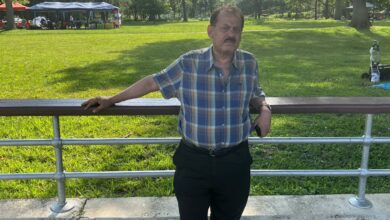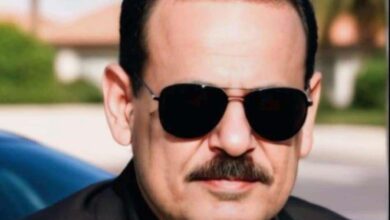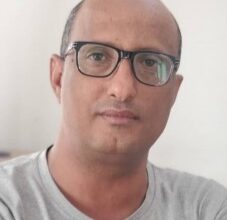Eating Dirt

Yemeni mp
Ahmed Saif Hashed
In my childhood, my cousin Salem Ahmed Mohammed Hashim, who is roughly ten months older than I am, shared with me the peculiar habit of eating dirt. Our craving for this earthy substance arose from the dire circumstances of our lives and the inadequate nutrition we endured together.
This poor nutrition accompanied our miserable childhood day by day, lingering through my adolescence and early youth. It weighed heavily on me and persisted until I began my journey in military college.
Decades went by before I grasped the true motivation behind my childhood habit of eating dirt, aside from its strangely appealing taste and the enjoyment I derived from it. I perhaps attributed this behavior to my youth, a lack of understanding of its harmful effects, or an inability to discern right from wrong. Alternatively, it might have stemmed from childish stubbornness and reactions to punishment, or from the ignorance and curiosity that, when faced with prohibition, transformed into a habit devoid of guilt, and even filled with a strange delight.
My solitary indulgence in dirt was immensely enjoyable, yet it invariably came with the certainty of punishment, even if it was sometimes delayed. The remnants of dirt mixed with my saliva would betray my actions without pretense. More than fifty years later, I learned that a child’s inclination to eat dirt is linked to a deficiency of iron in their body.
This compulsion to eat dirt, born from poor nutrition and a lack of essential iron, led to punishment for something beyond my control. Such punishment inflicted further suffering, creating deep-seated complexes that continued to grow within me, affecting both my conscious and subconscious mind. It could lead to behavioral disturbances and deviations that linger like shadows, or to a costly obstinacy that harms not only myself but also others in significant and devastating ways; the examples are far too numerous to recount.
In my early childhood, I ate dirt. I was a victim of my circumstances from a tender age—victimized by authority, ignorance, oppression, and improper upbringing; a victim of poverty, need, and deprivation; a victim of a reality shaped and imposed by countless factors.
What is truly lamentable today is that there are those who wish, even insist, on keeping me shackled by my poverty and need, turning me into a prize for power and war until my death. They want me to return to eating dirt for the remainder of my life, to live as a perpetual victim, burdened by daily struggles and weighed down by suffering, tethered to a bondage that seeks to trample my dignity and violate my existence forever. This is how I feel whenever I sense that humiliation is being wielded as a weapon against my rights and those of others like me in their quest for freedom, dignity, and existence.
I was amused by a saying that circulated during the war, attributed to a Yemeni citizen who expressed his plight amidst the suspension of salaries and the plundering of rights: “It’s true that we love the soil of our homeland, but don’t make us eat it.”
There are those who want me and people like me to remain distracted by the corruption of power and its violations, hindering our defense of people’s rights and freedoms. They also attempt to root out the bloody nails that strive to dig into the stone, and even wish that we couldn’t breathe, envious and competitive over that as well. It’s a base and savage era that defies imagination.
* * *
In my early childhood, while my mother would punish me for eating dirt, there were also moments when she would insistently urge me to do just that. What a paradox and confusion this created, amidst a tortured and wretched childhood burdened by ignorance and profound deprivation.
My mother would take me to visit the grave of my grandfather, Sheikh Hiyya, on certain days. The site included his shrine, his room, two domes, and several annexes. She would carry candles that she had dedicated to him for our sake, lighting them in the darkness while placing some unused bundles of wax in a niche of the room or on the edge of the grave. This way, anyone who might come another day could illuminate the shadows surrounding our grandfather. She performed the same rituals at the grave and shrine of our other grandfather, Sheikh Ahmad, who was nearby. His grave was perhaps a forearm’s height in a modest chamber, topped with a flat roof instead of a dome.
I vividly remember my mother lighting the shrine of our grandfather, Sheikh Huyay, her heart filled with overwhelming joy and immense happiness that seemed to overflow the confines of that sacred space. She would reach into a niche in the wall of the grave, retrieve some bits of dirt, eat a little herself, and then offer me some to consume. She encouraged me to devour it, believing it to be infused with the secret of her grandfather, who had journeyed from Hadhramout and settled here—perhaps a learned man or a sage known for his miraculous deeds.
I still recall how my mother urged me to eat the dirt, even beginning to consume some herself. She insisted that I partake, coaxing me to mimic her actions. She treated me like a mother feeding her child after weaning, desperately trying to convey that I would emerge from that place enriched with something I hadn’t possessed upon entering.
Despite missing the familiar pleasure of the dirt I was accustomed to, and suffering the consequences of consuming it, I found that the spirituality of the place, its majesty, and the reverence of its occupant—bolstered by my mother’s tales of his miracles and virtues—imbued it with a significance I could not dismiss. This was the narrative she instilled in me, recounted with unwavering confidence and certainty.
Whenever I fell ill or faced misfortune, my mother would invoke my grandfather, Sheikh Hayya, and my grandmother, Janoub, alongside my paternal grandfather, Sheikh Ahmed. Sometimes, she would add names like Ahmad Ibn Alwan and Shagath, beseeching them to heal me and protect me from all harm.
As a child, I believed that the dirt I consumed was remnants of my maternal grandfather’s bones, but later I realized that it came from atop the grave, not from its depths, and that my grandfather’s remains were still buried deep within. Despite my mother’s belief in the magical properties of her grandfather’s soil, I found it lacked the sweetness of the dirt I was used to eating, which I would secretly consume away from her watchful eyes.
Just as my mother insisted on my eating my grandfather’s dirt, she did the same with drinking milk. She had a cow blessed by God, and as soon as I finished a portion, she would implore me in a hushed voice to drink more, repeating, “Drink… have more… drink well… it will strengthen you.” Her soft tone suggested she didn’t want anyone to overhear us, and she would persistently encourage me to drink more until she eventually gave up. She loved me more than my father did, favoring me in everything, even in the milk he had each evening.
My mother’s insistence on getting me to drink more of the cow’s milk made me feel she wanted me to grow quickly and become strong. I sensed that she wished for me to grow up immediately. As for eating the dirt from the grave, she believed she was entrusting me with her grandfather’s secret, shielding me from all diseases, evils, and misfortunes.
Cow’s milk didn’t entice me; rather, it was “Nido” milk that I craved. Perhaps it felt like a part of me, satisfying my needs when my mother’s breast could no longer suffice, especially as she too suffered from malnutrition while I was still under two years old. To this day, I yearn to gulp it down in large quantities, just as I did in childhood, school, and even adolescence, making me feel somewhat abnormal as I spooned the milk into my mouth with insatiable greed.
When I was likely in my first year of school, I had a vision in which I led people in prayer at the shrine. I saw Sheikh Hiyya and other elements I’ve since forgotten, even though the vision was as clear and detailed as the break of dawn, as if it were reality rather than merely a dream.
My mother and father showed an unusual interest in my vision, eagerly asking me to recount it for them once more. I could see their genuine delight and keen attention as I shared my story with them. Perhaps they believed the vision to be a prophetic glimpse into my distant future, unaware that it would be rife with corruption, murderers, and tyrants, alongside fools and trivialities.
Throughout this long life, however, I have remained steadfast, ever vigilant against the possibility of falling. I am constantly wary of the terrifying descent that could happen not just once, but a thousand times.
* * *






